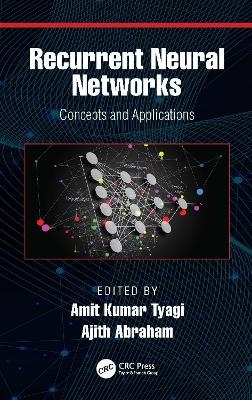
Recurrent Neural Networks
CRC Press (Verlag)
978-1-032-08164-9 (ISBN)
The text discusses recurrent neural networks for prediction and offers new insights into the learning algorithms, architectures, and stability of recurrent neural networks. It discusses important topics including recurrent and folding networks, long short-term memory (LSTM) networks, gated recurrent unit neural networks, language modeling, neural network model, activation function, feed-forward network, learning algorithm, neural turning machines, and approximation ability. The text discusses diverse applications in areas including air pollutant modeling and prediction, attractor discovery and chaos, ECG signal processing, and speech processing. Case studies are interspersed throughout the book for better understanding.
FEATURES
Covers computational analysis and understanding of natural languages
Discusses applications of recurrent neural network in e-Healthcare
Provides case studies in every chapter with respect to real-world scenarios
Examines open issues with natural language, health care, multimedia (Audio/Video), transportation, stock market, and logistics
The text is primarily written for undergraduate and graduate students, researchers, and industry professionals in the fields of electrical, electronics and communication, and computer engineering/information technology.
Amit Kumar Tyagi is Assistant Professor (Senior Grade), and Senior Researcher at Vellore Institute of Technology (VIT), Chennai Campus, India. His current research focuses on Machine Learning with Big data, Blockchain Technology, Data Science, Cyber Physical Systems, Smart & Secure Computing and Privacy. He has contributed to several projects such as "AARIN" and "P3-Block" to address some of the open issues related to the privacy breaches in Vehicular Applications (such as Parking) and Medical Cyber Physical Systems. He received his Ph.D. Degree from Pondicherry Central University, India. He is a member of the IEEE Ajith Abraham is the Director of Machine Intelligence Research Labs (MIR Labs), a Not-for-Profit Scientific Network for Innovation and Research Excellence connecting Industry and Academia. As an Investigator and Co-Investigator, he has won research grants worth over 100+ Million US$ from Australia, USA, EU, Italy, Czech Republic, France, Malaysia and China. His research focuses on real world problems in the fields of machine intelligence, cyber-physical systems, Internet of things, network security, sensor networks, Web intelligence, Web services, and data mining. He is the Chair of the IEEE Systems Man and Cybernetics Society Technical Committee on Soft Computing. He is the editor-in-chief of Engineering Applications of Artificial Intelligence (EAAI) and serves/served on the editorial board of several International Journals. He received his Ph.D. Degree in Computer Science from Monash University, Melbourne, Australia.
Section I: Introduction 1. A Road Map to Artificial Neural Network 2. Applications of Recurrent Neural Network: Overview and Case Studies 3. Image to Text Processing Using Convolution Neural Networks 4. Fuzzy Orienteering Problem Using Genetic Search 5. A Comparative Analysis of Stock Value Prediction Using Machine Learning Technique Section II: Process and Methods 6. Developing Hybrid Machine Learning Techniques to Forecast the Water Quality Index (DWM-Bat & DMARS) 7. Analysis of RNNs and Different ML and DL Classifiers on Speech- Based Emotion Recognition System Using Linear and Nonlinear Features 8. Web Service User Diagnostics with Deep Learning Architectures 9. D-SegNet: A Modified Encoder-Decoder Approach for Pixel-Wise Classification of Brain Tumor from MRI Images 10. Data Analytics for Intrusion Detection System Based on Recurrent Neural Network and Supervised Machine Learning Methods Section III: Applications 11. Triple Steps for Verifying Chemical Reaction Based on Deep Whale Optimization Algorithm (VCR-WOA) 12. Structural Health Monitoring of Existing Building Structures for Creating Green Smart Cities Using Deep Learning 13 Artificial Intelligence-Based Mobile Bill Payment System Using Biometric Fingerprint 14. An Efficient Transfer Learning–Based CNN Multi-Label Classification and ResUNET Based Segmentation of Brain Tumor in MRI 15. Deep Learning–Based Financial Forecasting of NSE Using Sentiment Analysis 16. An Efficient Convolutional Neural Network with Image Augmentation for Cassava Leaf Disease Detection Section IV: Post–COVID-19 Futuristic Scenarios– Based Applications: Issues and Challenges 17. AI-Based Classification and Detection of COVID-19 on Medical Images Using Deep Learning 18. An Innovative Electronic Sterilization System (S-Vehicle, NaOCI.5H2O and CeO2NP) 19. Comparative Forecasts of Confirmed COVID-19 Cases in Botswana Using Box-Jenkin’s ARIMA and Exponential Smoothing State-Space Models 20. Recent Advancement in Deep Learning: Open Issues, Challenges, and a Way Forward
| Erscheinungsdatum | 21.07.2022 |
|---|---|
| Zusatzinfo | 72 Tables, black and white; 131 Line drawings, black and white; 70 Halftones, black and white; 86 Illustrations, color; 115 Illustrations, black and white |
| Verlagsort | London |
| Sprache | englisch |
| Maße | 156 x 234 mm |
| Gewicht | 666 g |
| Themenwelt | Informatik ► Theorie / Studium ► Künstliche Intelligenz / Robotik |
| Technik ► Elektrotechnik / Energietechnik | |
| ISBN-10 | 1-032-08164-3 / 1032081643 |
| ISBN-13 | 978-1-032-08164-9 / 9781032081649 |
| Zustand | Neuware |
| Haben Sie eine Frage zum Produkt? |
aus dem Bereich


